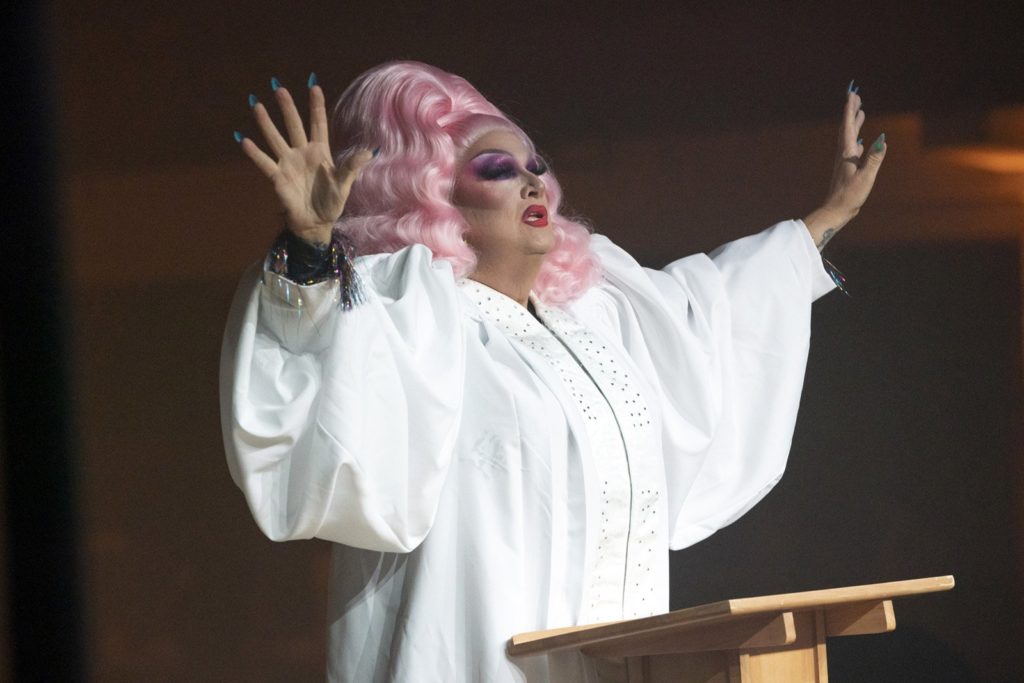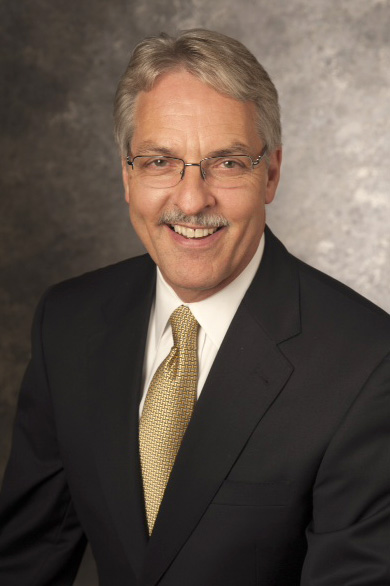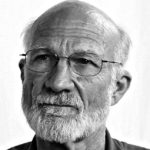Isaac Simmons made headlines in April when he became the first openly gay man to receive approval as a certified candidate for ordained ministry in his United Methodist (Illinois Great Rivers) annual conference. So far as anyone knows, he is also the first drag queen thus certified.
More recently, the Rev. Craig Duke, also a United Methodist, performed in drag on the HBO Special, “We’re Here.” One man is gay. The other is in a long-term heterosexual marriage. One man considers his drag queen persona – “Penny Cost” – a key part of his identity and calling. The other, it appears, sought to understand through participation, so that he could provide radical welcome to all who might come to the church he serves as pastor. Both together represent the leading edge of determined activism.
This advocacy for social change has explicit theological underpinnings. To understand how requires delving into Queer theology, a categorical term for a set of critical responses and correctives to traditional views. Queer theology is a relatively new and developing field that relies on schools of thought associated with critical theory. Queer theology “theologizes” these critical perspectives to transform and mobilize the church for the transformation of society.
First, Queer theology views reality as radically contingent, a view that has strong implications for a Christian view of human nature. We construct our sense of reality through language. We likewise construct our views of what is real and good for human nature, also through language. The problem, Queer theorists and theologians say, is that taken-for-granted terms, like “male” and “female,” and the state- or church-approved sexual relations between only male and female, have power implications that marginalize and make odious all who don’t fit the norm. Queer theology therefore repudiates any assertion that God created only male and female or that these features of creation are fixed in their expression.
One could fairly characterize Queer theology’s doctrine of human nature, therefore, as a radically inductive search for a person’s self-knowledge in the creation of an identity, an identity that remains fluid and changeable. The “made this way” claims of some lgbtquia+ advocates therefore smacks too much of essentialism and determinism for Queer theologians. Even homosexual monogamous marriage (ironically) serves to buttress heteronormative social relations. “Heteronormative” refers to the maintenance of social relations that privilege the status (I’m choosing words carefully) of identifiers like “male” and “female” in support of traditional views of marriage. Consequently, argue Queer theologians, the traditional but false narratives of human sexuality and gender identity must be overturned, which requires the enactment of transgressive behavior. Hence not only the legitimacy of drag queen art, to go back to our beginning example, but its moral imperative.
A second point, which might surprise some, is Queer theology’s emphasis on incarnation, understood Christologically in (almost) in traditional terms, whereby God assumes human nature in Jesus of Nazareth. But then, once that point is made, the thinking turns back to anthropology – human nature. Rather than exploring how God became human in Christ to save us from our sins and bring about the new creation, Queer theology emphasizes that, in the incarnation, God demonstrates God’s affirmation of human embodiment. The Cambridge Dictionary of Christian Theology illustrates this turn. It describes Queer theology as taking “as its starting point the radical, and as yet unexplored, nature of the doctrine of the incarnation.” The word “unexplored” in that description carries much weight. How does “incarnation” almost as a metaphor help explore the fullness of human nature? We are a far cry from traditional Christian thinking on the nature and work of Christ.
Backing up further to the basic topic of divine revelation (how God speaks and reveals his will for creation), Queer theologies tend to subsume divine speech under the category of human experience. Theology becomes anthropology once again. We are back to the radical contingency of human language, with all its power implications. Queer theologians therefore demonstrate a wholesale suspicion toward traditional convictions about divine revelation. Linn Tonstad’s very enlightening book, Queer Theology: Beyond Apologetics, gives us an example. Tonstad quotes Marcella Althaus-Reid (a ground-breaking Queer theologian), on the matter: “God speaks through the ‘complexity of the unruly sexualities and relationships of people’” (p. 93, italics added).
Gathering up the bits of this brief sketch, we see (1) that the radical contingency of human nature, coupled with how critical theorists analyze power relations in language, leads to the in-principle rejection of the givenness of sexual boundaries. (2) Christology in Queer theology effectively de-centers the Incarnation of Christ – or treats it as little more than a point of departure – for exploring the implications of human “embodied-ness.” I suggest that, from a theological point of view, then, we have anthropology masquerading as Christology. Again from the Cambridge Dictionary article: “Within Queer theology…fall stories tell us of the incarnation all human beings share and the redemptive space we strive for.” Not the assumption of human nature by God, but the enfleshment of all humans. (3) Finally, we also saw how Queer theologians think of divine revelation. Again, the human dimension is emphasized to the virtual exclusion of real divine speech, discernible, as it were, on God’s terms. Theologically orthodox theologians recognize that divine speech is mediated through human speech but hold the two domains in tension. Queer theology collapses them and we wind up effectively with nothing but human speech.
Perhaps this little essay has helped to show some of the intellectual moorings that purport to justify drag queen art, but the more fundamental concern, in my view, is what Queer theology does with the Christian faith at a deeper level. Since arguments about sexuality and gender identity are so constantly front-and-center in American society, we need to understand the criticisms of traditional views as best we can, but we also need to stay alert and hold fast to our confession. We have good reasons. God grant us courage and grace to stand firm.
The Rev. Stephen W. Rankin, PhD, is an ordained elder in the North Texas Conference of the United Methodist Church.
UPDATE [10/14/2022]: Isaac Simmons preached October 2 at Allendale UMC in St. Petersburg, Florida, as Ms. Penny Cost, including a children’s sermon. Read more here.






Comment by Pastor Mike on December 7, 2021 at 6:53 am
“Queer theology” is nothing more than humanism masquerading as theology. It celebrates humans and the flesh instead of God and the Divine.
Comment by Mike on December 7, 2021 at 8:41 am
When you add any adjective to the word “theology”, be it “liberation”, “feminist”, or “queer”, it is no longer theology.
“Idolatry” might be a better word. “Perversion” would also be suitable.
Comment by Star Tripper on December 7, 2021 at 8:50 am
Drag Queens are inversion which is a hallmark of Satanism. Queer Theology is word salad to confuse the seminarians and get them to accept the inversion.
Comment by David S. on December 7, 2021 at 9:11 am
While to my knowledge, the official UMC entities have yet to cross this Rubicon or Danube (alluding to Caesar and Hannibal’s marches toward Rome, or the Barbarians, Mongols, and Turks advances towards Rome, Central Europe, and Vienna), the PC(USA), ever so eager to push theological boundaries in its assault against historic, orthodox Christian teachings, has. Specifically, the denomination had an official day on centered queer theology, which included a segment where Rev. Ashley DeTar Birt masqueraded as her alter ego…Mr. Chance, an allusion to the late, beloved, TV personality Fred Rogers, who was an ordained Presbyterian minister. (The queer theology day was one of five days during the “Week of Action”, which seemed more of akin to the activities of a political party’s quadrennial convention, clothed in purportedly religious garb.) While I applaud the theme of Ms. Birt’s segment, which focused on “Who is our neighbor?”, the theme broke down, because the goal was to promote a worldview, which runs counter to historic, orthodoxy regarding matters associated with sex and gender. Being kind, considerate, and compassionate to one’s neighbor, regardless of sex/gender, race, ethnicity, religion, political affiliation, etc. is something that is consistent with Christian teaching. Tragically, it is something that the church has repeatedly failed to do consistently. However, saying that I must accept as a truth claim, which is what the false preachers and teachers leading the PC(USA) demand, that which runs contrary to Christian orthodoxy is quite a different matter. As noted above, drag inverts the created order. While it may make for a good laugh when done as part of a comedy routine done in good taste, saying that this is just another expression of God through His creation is quite another.
https://www.presbyterianmission.org/story/week-of-action-lgbtqia-day-includes-homage-to-mister-rogers/
Comment by What's worse? on December 7, 2021 at 9:52 am
I truly hope this gets posted because it is a serious comment. Were these people working on this theology while smoking pot or something? It’s so warped it is unbelievable that serious people would even try to do something like this. Nietzsche makes more sense than this crazy drivel.
God loves all of His creation, even those who are harmed by sin. But it is to the church’s shame that this even gets a hearing.
Comment by Karole Fedrick on December 7, 2021 at 10:26 am
The term may be new, but Satan has always worked the same way beginning in Genesis 3:1-5; corrupt the language to change the culture and make impossible promises. As with Marxism, the issue is never the issue; the issue is always the revolution, aka, rebellion against God that manifests itself in countless ways.
Comment by Brian Evers on December 7, 2021 at 2:26 pm
It doesn’t matter if a drag queen is in a heterosexual relationship or not. That person is beclowning themselves and the word of Christ. We can make excuses for this person but it’s clear it’s an incremental move to make aberrant unChristian behavior normal so that others who aren’t faithful can pry the door further. There is no queer theology. We need to call it what it is which is heresy or apostasy.
Comment by Jeff on December 8, 2021 at 2:32 am
“Pondering drag queen theology”???
Seriously???
TO HELL WITH DRAG QUEEN THEOLOGY!!!
I mean that quite literally.
Put down the crack pipe, swear off the opioids, get a clue.
What the HELL has happened to IRD to even give space to this sort of crap!
Comment by Jeffrey Walton on December 8, 2021 at 10:47 am
Jeff, the article is a clear critique of the theological underpinnings of queer theology. IRD obviously isn’t endorsing queer theology or drag queen clergy.
Comment by Patrick on December 8, 2021 at 8:08 am
I have said it before: Drag is the misogynistic equivalent of blackface.
It may take one hundred years before this is condemned by women, and seen as repugnant by many, as blackface is now. In the meantime, we remain faithful to Jesus Christ, until he returns in glory to end this evil nonsense.
Comment by Herb on December 8, 2021 at 9:31 am
Jeff,
Neither Stephen Rankin nor IRD are endorsing Drag Queen Theology. They’re offering us needed perspective and insight. I, for one, am grateful for that. I certainly don’t agree with Drag Queen Theology, either.
Comment by Marc on December 8, 2021 at 12:03 pm
Newsmax said today that Rev. Duke is no longer employed as a Methodist minister. It’s heartening that there are a few American Methodists with a backbone to enforce the traditional line!
Comment by Jeffrey Walton on December 8, 2021 at 2:49 pm
Marc, I haven’t been able to confirm that Craig Duke is no longer a United Methodist minister (from what I can tell he hasn’t committed a chargeable offense), but can confirm that Duke is no longer Senior Pastor at Newburgh UMC. Kudos to lay leaders in the congregation for acting quickly and decisively. Assumedly the Indiana Conference will relocate him to a different church.
Comment by Steve on December 8, 2021 at 2:13 pm
Is Craig Duke going to put on blackface to “understand through participation?” Silly rationalization.
Comment by Sigma on December 8, 2021 at 10:21 pm
Thank you for this well-thought-out piece. In church, we “celebrate” what God has done thru Jesus Christ. It is blasphemy to give glory to anything but God.
Any theology, written or unwritten that gives glory to man is a serious perversion of the Gospel message.
Comment by Jed Hester on December 9, 2021 at 6:05 pm
Sorry Stephen but taking that much time to write about this foolishness makes the fatal error of trying to analyze the king having no clothes on as something of actual academic concern. The child’s statement of reality was much more sufficient and accurate.
Save your mighty pen for things that are worthwhile. Maybe a little time pastoring a church and stepping out of the artificiality of the Ivory Tower would be refreshing and eye opening?
Comment by Jun Valmores on December 9, 2021 at 8:03 pm
Thanks for this article Stephen!
Comment by April user on December 11, 2021 at 11:03 am
Drag: a grotesque mockery of women.
Comment by Lee Cary on December 19, 2021 at 10:49 am
Evidence of cultural rot abounds.